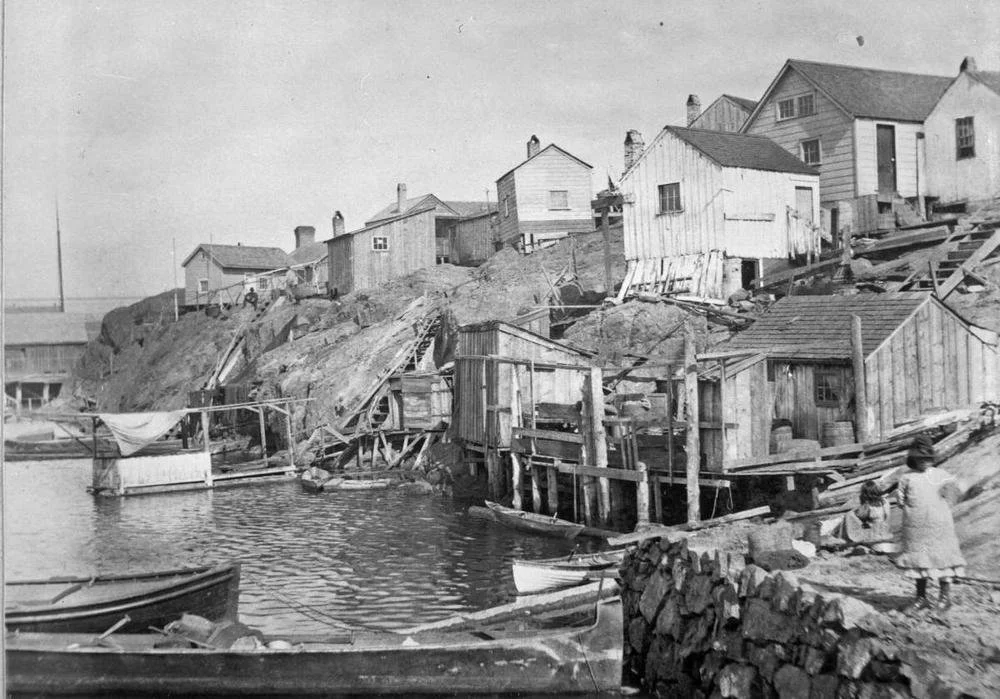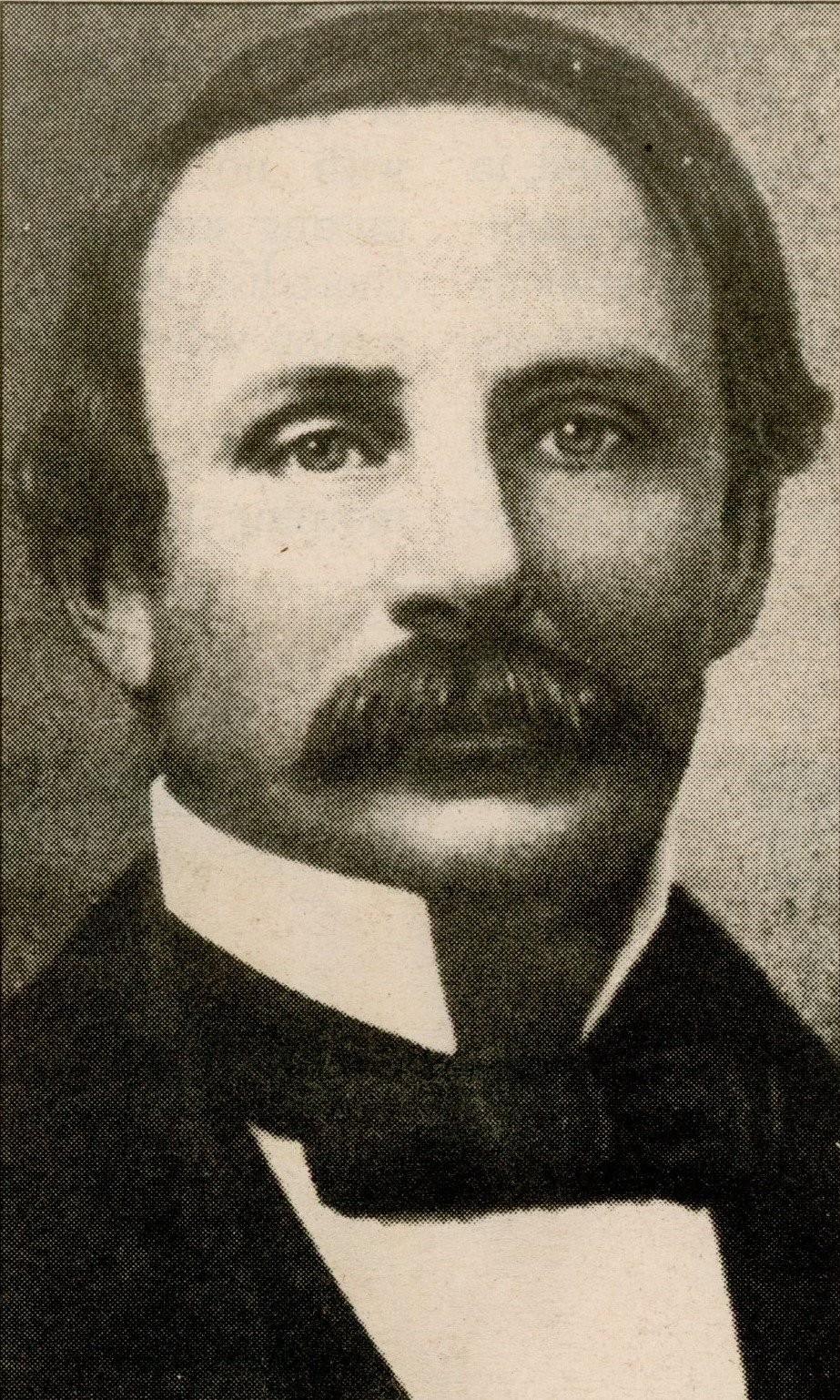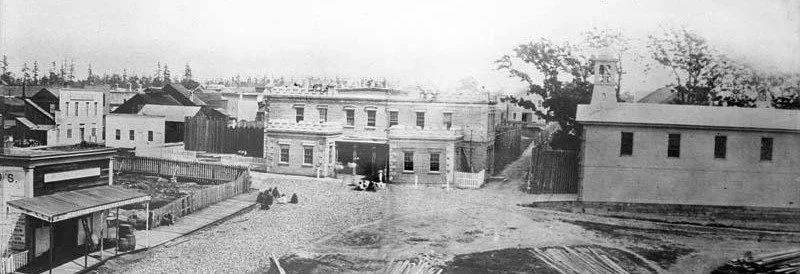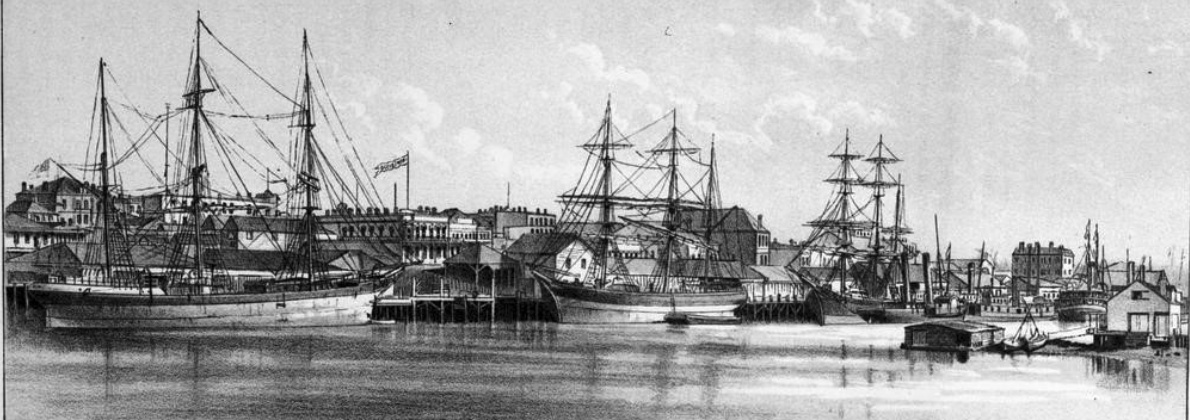John Butts, King of Knaves
Conclusion
While serving yet another sentence for bootlegging, John was stricken with paralysis from the waist down and taken to the hospital in a hand cart. There, he was again examined to ensure that he wasn't faking. Upon being satisfied that he was indeed paralyzed (a test involving needle pricks, no doubt), hospital staff gave him every attention.
John Butts could be almost eloquent at times and he frequently quoted Biblical quotations, making some wonder about his origins. But the mystery was never solved. —Author’s Collection
John's last days were spent in reading religious works and, when weather permitted, in sunbathing on the front steps.
And so it went, day after day—until Dr. James Trimble observed that John’s paralysis seemed to have departed. To prove his point, he ordered attendants to strip the patient, place him in a chair under a balcony, and douse him with buckets of cold sea water!
Again and again and again, John was drenched as he pleaded for mercy and swore that he couldn't walk. It took 36 buckets of cold water to convince him that he was cured when, with an oath, he leapt up from the chair and hid. But, instead of grabbing his clothes and beating a retreat as any lesser man would have done, John pulled on his trousers, lay down in the grass—and dragged himself, moaning piteously, back into the hospital.
An eager crowd gathered next day to witness his rumoured eviction. They were cheated of a further spectacle, however, John having vacated the premises without a fight after being informed by a fellow patient (coached by Dr. Trimble, no doubt) that he was to be again doused with cold water; failing that, he was to be “bound to a red-hot stove and kept there till...roasted!”
That was too much for our man John!
Paralysis instantly forgotten, he ran outside, there to refuse to leave the grounds until threatened by an orderly with a club. He then entertained a large following as he hobbled “painfully” towards town. Leaning upon a cane and pausing every few steps as though weary and sore, he finally reached his old haunt, Johnson Street, where he boasted of how he’d fooled the doctors, and announced his intention to resume selling tangle-leg whisky.
As he hobbled back to his shack, John entertained a large crowd. —BC Archives
“Whisky,” roared John, “is an old enemy of mine; it killed my big brother, and caused me to serve nine months in the chain gang. Consequently, whenever I get a bottle of it I feel as if I’d like to catch it round the neck and take satisfaction out of it!”
“We don't believe a greater villain ever drew breath,” raged the Colonist in an editorial which must be without equal. “He was a nuisance in California, and he is a nuisance here. We cannot get rid of him because he is so great a scamp no captain can be found to take him to a far distant country aboard of his vessel for fear of a mutiny or something as bad; at San Francisco detectives want him as a state prison recruit, and our American neighbours on the Sound say that if he comes there they will box him up and send him back.
“If he is put in prison he is continually raising a row and causing trouble among the convicts. In short, he is a blot, a disgrace, a moral leper and a curse. The authorities feel, when thinking of him, like the man who bought the elephant and didn't know what to do with it. What SHALL we do with him?”
Although he hadn’t completed his sentence for bootlegging that he’d aborted by playing paralyzed, John was allowed to roam free. But, just a week later, he was up on another charge, that of being a “rogue and a vagabond”.
Police Magistrate A.F. Pemberton. —BC Archives
Pemberton, perhaps goaded by the newspaper’s complaint, sentenced John to a further three months in the chain gang. Although this hadn't worked in the past, Pemberton seemingly had resigned himself to what was becoming a pattern. As did Butts who, uncharacteristically, failed to give a rousing address from the prisoner's box and settled for a mild denunciation of the Colonist for having “libelled” him. He concluded, half-heartedly, with his usual promise to leave the colony if freed.
No sooner was he released than, on July 4th, when most Victorians were observing the American holiday by attending horse races in Beacon Hill Park, John called at the house of John Yurman. As Yurman was at the races, John settled for three of his turkeys. Arrested, he received another three months in the Bastion Square Police Barracks.
Centre, Victoria’s ‘castellated’ police barracks where Butts sometimes found himself reduced to bread and water. —BC Archives
Back on the street, he was soon in trouble. For once it wasn't his fault, he having been provoked beyond endurance by a couple's calling him names and throwing stones. Despite witnesses’ testimony that John had turned the other cheek before retaliating, he was fined 50 shillings for assault. Remarkably, he had that much in his exchequer and escaped further servitude, repairing city streets.
Then, of all things, Butts claimed to have reformed. His having turned over a new leaf was confirmed, seemingly, by his being re-elected to the position of town crier, which he managed to perform with zeal without misdemeanour for all of six months.
But, of course, it couldn't last. John soon reverted to his old pastime of ending his spiels with pointed remarks and unkind parodies of prominent citizens. This adlibbing delighted his audience but wasn't without hazard. While regarding a crowd with jibes aimed at a Capt. Simpson, he found himself face-to-face with the slandered gentleman in mid-sentence. After Simpson, who seems to be in a poor sport, ended John's performance with several well-aimed blows of his cane, a bruised and battered Butts limped into court to charge him with a “foul and cowardly attack”.
Enjoying the rare role of plaintiff, John made the most of his courtroom performance. But Magistrate Pemberton cut him short with what was termed a “most scathing rebuke”. Then, no doubt against his will, he fined Simpson 40 shillings. The captain, it was reported, paid his fine “with the air of a man who had got his money's worth”.
The Colonist observed that John's habits required a “kind of moral tinkering from the magisterial hands of Mr. Pemberton at least once a month”.
For all of his sins—theft, slander, bootlegging, vagrancy, assault—John usually faced the music like a man, but for a little oratory and his oft-made but never fulfilled promises to reform or to leave the colony. Pemberton dutifully played along by allowing Butts to wax poetically in the dock before reassigning him to the chain gang. Likely, John’s courtroom appearances provided tragicomic relief in a gloomy parade.
Newspaper reporters, too, enjoyed John's antics, giving hilarious, detailed accounts of his appearances before the bench.
When John was charged with slandering a leading citizen, he made a tearful apology (a favourite defence) and the ever-patient Pemberton let him down gently with nothing more than court costs. At this, John bolted from the dock “with smiles of joy illuminating his jocund face and the teardrops listening like a puddle of dirty water in a Yates Street gutter when visited by a gleam of sunshine”.
Journalism has changed over the past century and a half-plus, as have, alas, the calibre of characters who usually find themselves before a humourless magistrate.
* * * * *
Well, all good things must come to an end. even such a gloriously outrageous romp as that of John Butts, Victoria's 1860s “town cryer to her Britannic Majesty”— when he wasn't wearing his other hats as slanderer, vagrant, drunkard, bootlegger and thief.
Time and again, he’d appeared before Police Magistrate Augustus F. Pemberton, charged with this ‘n’ that, and as a “rogue and vagabond," to tearfully plead for forgiveness with some Biblical quotations—“while the lamp holds out to burn, the vilest sinner may return quote”—or an apology so eloquently expressed that he always left his listeners wondering about his upbringing and education. But other than that that he’d had to flee Australia, which he claimed to be his native land, and the vigilantes in San Francisco, nothing more was ever learned of his past.
His encounters with Victoria police seem without end. When a Mr. Carswell accused John of having slandered him during one of his street corner spiels, John burst into tears, apologized, and blamed his indiscretion on overwork(!) and liquor. Taken aback, the good Mr. Carswell asked Pemberton to allow John to go free. The magistrate reluctantly conceded that John didn’t seem to be so great a nuisance as before. He also noted that the Bastion Square jailers had given up all hope of ever setting him back on the right path.
And so it went, with John taking his place in the prisoner's box for stealing two bottles of brandy; for “borrowing” a photographer's equipment; for burglary; for the theft of a goose. As always, he’d beg the magistrate’s indulgence, listen to yet another stern lecture, plead for yet another chance to leave the colony, then resume his place in the ball and chain brigade, working on city streets.
When it became too hard for him, he refused to leave his cell, although he made no further claims to being paralyzed. Reduced to bread and water, he’d stretch out on his bunk and pass his time by singing hymns and the national anthem.
Finally came a momentous day. During every court appearance John had belaboured his promise to leave the country. This time, charged with stealing 200 newspapers (no wonder the Colonist called him “a disgrace, a moral leper and a curse”), he was astonished to hear Pemberton state that a ship had been found to take him to Australia!
When John saw the large crowd that had gathered to see him off at the dock, his spirits revived and he proceeded to make jokes and to wave. —BC Archives
Gently, the magistrate urged the sobbing Butts to mend “his ways before he became too hardened too vice”.
As word of his impending departure swept Victoria, those who’d suffered John's razor-edged tongue breathed a sigh of relief, and those who’d silently enjoyed his outrageous antics heard the news with regret. But it was official, John having been signed on board the China-bound ship Rodoma.
A sobbing Butts bade farewell to his jailers and to his fellow prisoners for the last time. During the short walk to the wharf, he continued to weep freely—until he saw that a large crowd had gathered to see him off. Spirits instantly regained, he made the most of the occasion by shouting jokes and waving to his fans.
Then he was gone, never again to set Victoria on its ear with his antics. Never again would the city have a town crier who ended his spiels with “God save John Butts!” instead of “God save the Queen!” Never again would residents know the likes of the scoundrel whose contract for cleaning mud and garbage from Government Street was torn up when he was caught dumping everything on Yates Street.
Never again would the Methodist Women's afternoon tea end in near-riot after our unsung hero, hired for the day as a waiter, spiked the teapots with two bottles of brandy!
“Adieu! Poor houseless, homeless vagrant,” waved the Colonist in fond farewell. “Your offences against society have been many and your punishment often severe, but God created you for some purpose, and you may yet become a shining light in the national councils of the land of Confucius.”
Thus ended the amazing saga (at least, that we know of) of John Butts, town crier, king of knaves and all-time champion character of old Victoria.
* * * * *
Years ago, an article I’d written about John Butts drew this letter from a reader:
Oyez Oyez Oyez
Dear Editor: My Lords and Ladies may I publicly proclaim my thanks and offer congratulations on your article by T.W. Paterson in respect of Town Crier John Butts (Town Crier was Victoria’s ‘King of Knaves,’ Jan. 19.)
As Town Crier for Sidney and North Saanich I found it most interesting.
God bless Canada. God save our Queen.
—Kenny Podmore, Town Crier, Sidney and North Saanich.






